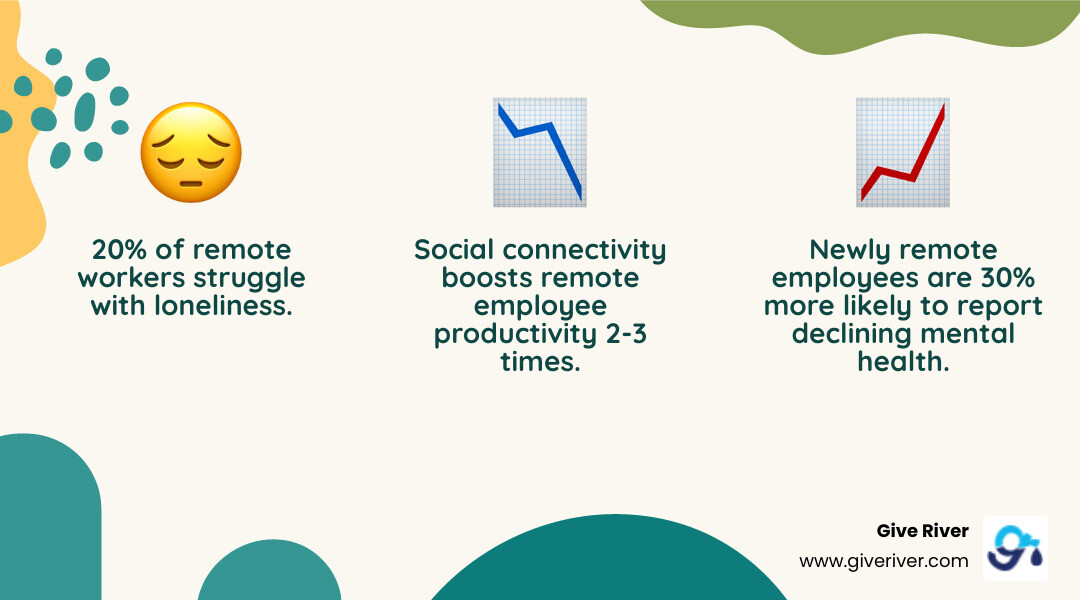Play On: Virtual Games to Connect Your Work From Home Crew
Connect your remote team! Discover the best virtual games for colleagues working from home to boost morale, communication, and culture.

Why Remote Teams Need Virtual Games More Than Ever
Games for colleagues working from home have become essential tools for maintaining team connection and productivity in our increasingly remote work landscape. Here are the top virtual games that can transform your remote team dynamics:
- Quick Icebreakers: Two Truths and a Lie, Virtual Show & Tell, Remote Work Bingo
- Communication Games: Online Pictionary, Virtual Charades, Guess the Background
- Team Building Activities: Virtual Escape Rooms, Online Trivia, Collaborative Playlist Creation
- Skill-Building Games: Virtual Scavenger Hunts, Problem-Solving Challenges, Role-Playing Exercises
- Recognition Games: Peer Appreciation Activities, Team Achievement Celebrations, Good Deeds Challenges
The statistics paint a clear picture of why virtual games matter. 20% of remote workers struggle with loneliness, while newly remote employees are 30% more likely to report declining mental health than their office counterparts. But here's the encouraging news: social connectivity through games makes employees two to three times more likely to maintain or increase productivity in remote environments.
When 83% of businesses report that remote work has been successful for their organizations, yet isolation remains a persistent challenge, virtual games bridge the gap between productivity and human connection. They transform sterile video calls into moments of genuine laughter, collaboration, and team bonding.
While platforms like Bonusly and Kudos focus primarily on recognition, the future of remote team engagement lies in combining meaningful games with purposeful recognition—creating experiences that both entertain and build lasting workplace culture.
I'm Meghan Calhoun, and after two decades of driving results in high-pressure environments—from television hosting to advertising sales—I've learned that the best games for colleagues working from home don't just fill time, they fill the human connection gap that remote work often creates. Through my work with Give River, I've seen how strategic gamification transforms isolated workers into thriving, connected teams.

Games for colleagues working from home helpful reading:
Why Press Play? The Undeniable Benefits of Virtual Games for Remote Teams
Remote work offers incredible freedom, but it also brings a quiet challenge: isolation. (If you're curious about how "remote work" is formally defined, check out this concise overview.) The numbers are clear: 20% of remote workers struggle with loneliness, and newly remote employees are 30% more likely to report declining mental health than their office-based peers.
But what if we could transform this challenge into an opportunity for deeper connection and stronger teams? This is exactly where virtual team building games shine. They're designed to bridge the miles that separate us, fostering genuine connection, boosting morale, and ensuring every team member feels engaged, seen, and valued. When we step into a shared virtual playground, even for a short while, we naturally build trust, sharpen our communication skills, and weave the strong social bonds essential for a truly cohesive team.
The impact of integrating games for colleagues working from home goes far beyond just "fun and games." These experiences offer a multitude of benefits that directly contribute to a thriving remote workforce. They are brilliant for boosting morale and engagement, injecting a much-needed dose of spontaneity and joy into the workday. This isn't just about stress reduction; as research suggests, a little humor and play can significantly increase job satisfaction and strengthen those vital social ties.
Beyond morale, virtual games are masters at fostering collaboration and improving communication. Many activities naturally require teamwork, creative problem-solving, and crystal-clear communication. Think of an online Pictionary session or a virtual escape room they demand active listening and strategic thinking, skills that seamlessly translate back into improved professional collaboration. It's a fantastic way for your people to connect and interact outside of project deadlines and meeting agendas.
These games are also powerful tools for building company culture in a remote world. They offer unique chances to reinforce shared values, celebrate achievements, and cultivate a positive, inclusive environment where everyone feels like they truly belong. And let's not forget the direct link to performance: social connectivity isn't just good for the soul, it makes employees two to three times more likely to maintain or even increase their productivity in a remote setting. When team members feel genuinely connected and supported, their motivation soars, and their performance follows suit.
Crucially, virtual games are frontline defenders against combating isolation and loneliness. They create structured, yet wonderfully casual, opportunities for interaction. These are the digital equivalent of those impromptu "water cooler" moments often missed in remote setups, helping employees feel more seen, heard, and connected to their peers. Furthermore, they contribute significantly to enhancing employee well-being. Simple activities, from a virtual art class to an emoji check-in, can lower stress and anxiety, fostering an overall healthier mental landscape for your team.
Integrating virtual team building games isn't about ticking a box for "fun." It's a smart, strategic investment in the mental health, productivity, and long-term success of your team. They are the vibrant threads that weave together the fabric of connection, creating a truly dynamic, inclusive, and productive atmosphere where every remote colleague can flourish.
A Curated List of the Best Games for Colleagues Working From Home
Finding the right games for colleagues working from home depends on your team's size, preferences, and the specific goals you aim to achieve. We've curated some of our favorite virtual games, from quick icebreakers to strategic skill-building exercises, to help you foster connection and boost team dynamics.
Quick & Free Games to Spark Instant Connection
A short, low-stakes activity is perfect for kicking off a meeting or filling a brief break. These games are easy, often free, and instantly boost energy using tools like Zoom, Microsoft Teams, or Slack.
For a touch of humor and camaraderie, try Remote Work Bingo. Create a Bingo board with common remote work experiences like "Said 'You're on mute'," "Attended a meeting in pajamas," or "Pet crashed the call." Players mark off squares as they happen for a fun, relatable connection. You can easily find free templates online to get started. Another classic is Two Truths and a Lie. Each person shares three statements about themselves—two true, one false—and the team guesses the lie. It’s a wonderful, low-pressure way for everyone to learn surprising facts about their colleagues.
For a burst of creative fun, Skribbl.io offers an online Pictionary where one person draws and others guess, leading to hilarious moments. Virtual Charades, adapted for video calls with an online prompt generator, also guarantees laughs and practices non-verbal communication. To hone listening skills, play "Can You Hear Me Now?" One person describes an abstract image using only shapes and lines for others to draw. This game brilliantly highlights the need for clear remote communication.
For super quick connections, simple Icebreakers are perfect. Ask questions like "What's your favorite comfort food?" or "Share one win from the week" in a round-robin format or via chat. Even simple emoji check-ins on a dedicated Slack channel can provide a low-pressure way for employees to share their feelings and for managers to gauge morale. These quick and easy games for colleagues working from home are adaptable for various team sizes and can fit into short breaks. For even more inspiration, explore our resources on Fun Ice Breaker Questions for Virtual Meetings and Free Online Team Games.

Hosted & Premium Games for Unforgettable Team Events
For special occasions, team offsites, or when you want a more structured and facilitated experience, investing in hosted or premium virtual games can create truly memorable events. These often offer deeper engagement and professional facilitation, allowing your team to simply focus on having fun and connecting.
Immersive experiences like Virtual Escape Rooms challenge teams to solve puzzles and find clues within a themed virtual environment. They are fantastic for promoting problem-solving, collaboration, and strategic thinking. Similarly, Virtual Murder Mysteries turn teams into detectives, analyzing clues and interviewing suspects to solve a whodunit scenario, promoting critical thinking and communication. For a lighter, party-game vibe, Jackbox Games (featuring titles like Quiplash and Fibbage) are incredibly popular. Only one person needs to own the game, and others can play along using their phones, making them easy to set up, highly interactive, and guaranteed to spark laughter.
Many professional services offer hosted experiences like Virtual Trivia Time Machine, which can be customized to various themes from pop culture to company history, fostering friendly competition. For globally distributed teams, platforms like Luna Park offer curated, "global friendly" virtual experiences that ensure inclusivity. You can also find The Virtual Do-Good Games, where teams compete in philanthropic activities that combine bonding with corporate social responsibility.
These premium experiences often come with professional facilitators who manage the game, allowing your team to simply focus on having fun and connecting. Give River offers a range of customizable experiences, including customizable recognition games and full-service hosted team-building events, designed to create unforgettable moments for your team. Explore more options for Remote Team Experiences and Virtual Team Experiences that can be custom to your organization's specific needs.
Strategic Games for Colleagues Working From Home to Build Key Skills
Beyond general fun, certain games for colleagues working from home can be specifically designed to address the unique needs and challenges of different teams, fostering skill development and deeper understanding.
For sales teams, activities that build camaraderie and collaborative strategy are invaluable. Consider "Grill the Seller," using increasingly ridiculous interview-style questions to learn about coworkers in a fun way. Making hitting quotas a team sport involves breaking into smaller groups for collaborative strategy sessions, fostering shared goals and motivation. A real-world example of skill-building is a sales team using the NATO Alphabet to improve phone calls, showcasing how shared learning can be integrated into play.
Customer support teams, who often face emotionally draining roles, can benefit greatly from specific games. Role-playing outrageous requests helps agents practice empathy, problem-solving, and find humor in their work. Virtual art classes can significantly lower stress and anxiety, providing a creative outlet and a bonding experience. Even sharing "customer wins" during meetings can boost morale and remind support agents of their collective purpose.
When teams are transitioning to remote work, newly remote teams need activities that help members get to know each other personally. Personality tests like DiSC or Enneagram can improve team understanding by revealing communication styles. A game of "Something in Common" involves breaking into small groups to find shared experiences or traits, building rapport quickly. These activities mimic in-person connections and provide crucial mental health support during a transition period, especially since newly remote employees are more likely to report declining mental health. For more insights, refer to Research on remote employee mental health.
Even experienced remote teams can struggle with loneliness, making activities that foster deeper personal connections vital. "Where in the World Are You?" involves sharing a photo from one's home office window and having others guess the location, sparking curiosity. A fun riff on "MTV Cribs" allows colleagues to share glimpses into their home lives, fostering deeper rapport. Randomized water cooler chats (using tools like Slack's Donut extension) provide brief, non-work-related conversations, simulating informal office interactions.
Many games can be adapted for different team sizes. For large groups, leverage breakout rooms on Zoom or Google Meet for smaller team discussions or competitive rounds (like trivia or Pictionary). For smaller groups, games like "Ten Strikes" (where participants share unique facts to eliminate others) or "Yellow Submarine" (a stealth game during calls) can be highly engaging. The key is to choose activities that encourage participation from everyone, regardless of group size. These strategic games for colleagues working from home foster collaboration and communication, helping to improve specific skill sets while strengthening bonds. Find more ways to improve your team's dynamics with Team Building Activities for Online Meetings.
Fostering a Winning Culture Beyond the Game
Turning Play into Lasting Team Cohesion
The magic of games for colleagues working from home doesn't end when the virtual confetti stops falling or the last trivia answer is revealed. The real change happens in the days and weeks that follow, when those moments of shared laughter and collaboration weave themselves into the fabric of your team's daily interactions.
Think about it: when your sales team successfully steers a virtual escape room together, they're not just solving puzzles—they're learning to communicate under pressure, leverage individual strengths, and trust each other's judgment. These skills don't disappear when the game ends; they show up in client meetings, project collaborations, and everyday problem-solving.
The most successful remote teams understand that virtual games are catalysts, not destinations. They create the foundation for lasting team cohesion by breaking down barriers, building trust, and establishing shared experiences that teams can reference and build upon. When employees feel genuinely connected to their colleagues, they're more engaged, more productive, and significantly more likely to stay with the company long-term.
While platforms like Bonusly and Kudos excel at peer-to-peer recognition, they often treat it as a separate function from the collaborative activities that build team cohesion. At Give River, we've developed what we call the 5G Method—a holistic strategy that integrates recognition, guidance, growth, gamification, and generosity to transform workplace culture from the inside out.
Our approach recognizes that effective gamification isn't about adding more games to your calendar. It's about embedding the spirit of play, purpose, and recognition into how your team collaborates every single day. When that same sales team that conquered the escape room can instantly recognize each other for daily wins, participate in good deed challenges that benefit their community, and see their professional growth celebrated through gamified elements, the impact becomes profound and lasting.
This is where the real culture change happens—when the collaborative energy from virtual team building extends into continuous connection, meaningful recognition, and shared purpose. It moves beyond "forced fun" to create genuine engagement that employees actually look forward to participating in.
The result? Teams that don't just work remotely—they thrive remotely. They've built the social bonds and communication skills that make every video call more productive, every project more collaborative, and every workday more fulfilling. Learn more about how we help organizations build this kind of lasting team cohesion with our Team Building Activities.


